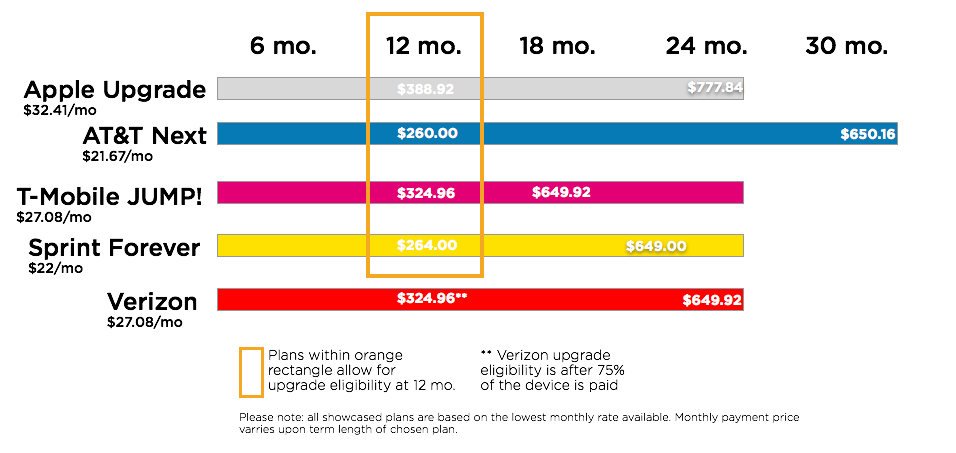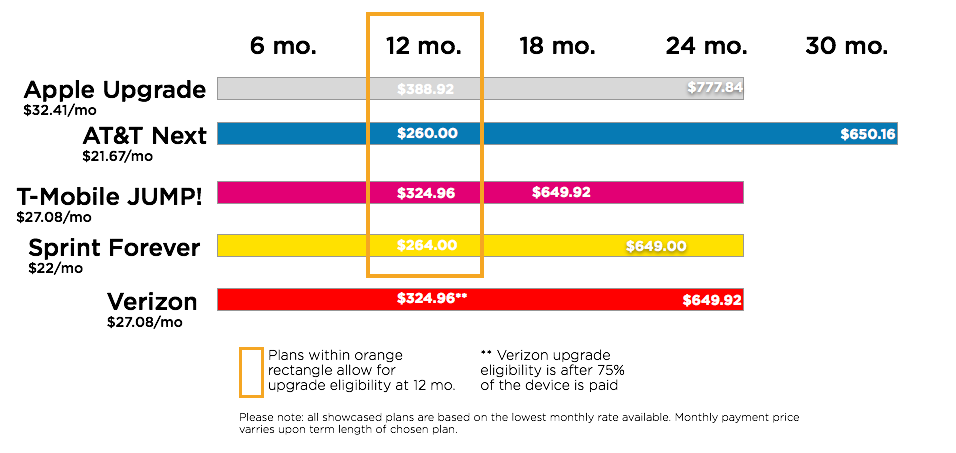Phone Upgrade Programs are Contracts in "Disguise"

The Internet erupted with joy last Wednesday when Apple introduced its own iPhone Upgrade Program to compete with the new phone upgrade plans emerging from mobile carriers. Apple’s program allows consumers to pay for a new unlocked iPhone in installments over 24 months and activate service from any of the four major US carriers. But the most exciting aspect to consumers seems to be the plan's iPhone upgrade option which kicks in after 12 months.
 gif via reddit.com
Apple’s upgrade plan announcement comes after some significant changes to US mobile carrier service. Over the past few years there has been a shift from the traditional mobile contract plan, which reduced the up-front price of a new phone but subsidized the discount via higher prices for service.
Since the shift, mobile service carriers seem to continually report increases in month-to-month plan users (pdf), meaning consumers are utilizing old phones, opting for cheaper devices, or shelling out the full price for a new device up front. This increase indicates US mobile users’ strong desire for flexibility, carrier choice and price transparency, rather than complicated 2-year service contracts. And that transition in consumer behavior as well as recent legal requirements regarding phone unlocking raise new hurdles for carriers to keep customers.
So in recent months mobile operators have introduced phone payment plans that are separate from service plans, with early upgrade options at no extra cost. Thus giving consumers a no-money-down device purchase option upon signing once again. A plan that comes with 0% financing and new phones when you want them sounds great right?
But before consumers jump into an upgrade plan that seems to give them the best up-front price, maybe we should really consider how different these unbundled phone programs are from the rigid old contract plans. From the looks of it carrier upgrade programs and even Apple’s iPhone Upgrade Program are potentially permanent-leasing schemes which, in fact, are just contracts of a different sort.

Is a car lease or renting an apartment somehow not a contractual agreement? Were people this excited for leasing programs when Zollie Frank introduced the first fleet of leased cars to the US back in 1939? Maybe so, but the sticker price on a car affects your income a bit more than a new iPhone 6S or 6S Plus.
Like Mr. Frank, Apple, T-Mobile, Sprint, AT&T, and Verizon are now offering phone “leasing” contracts, to be clear.
As Benedict Evans points out on his blog,
...these installments have been accompanied by the introduction of a set of 'rapid upgrade' plans that effectively put the user on a permanent rolling contract in exchange for a new phone every year.
So while you are likely able to get mobile service without a contract today, be aware that these shiny upgrade programs are really contracts in disguise. Will carriers let consumers opt for a different service provider while keeping their phone financing plan? Will Apple?
The fine print in device financing plans from AT&T, Verizon and Sprint all require customers to either return the financed device upon service cancellation or pay the total remaining balance in full immediately (essentially an early-termination fee). T-Mobile on the other hand, announced their “T-Mobile Lifetime Guarantee” on Thursday, claiming they would allow users to cut their service while keeping their financing. Their website states otherwise at the moment.
It seems we as consumers, while not necessarily locked to a carrier service plan anymore, are considering locking ourselves to carriers’ seemingly appealing upgrade plans. While Apple’s alternative gives users the ability to stay truly “off-contract” from their carrier, it locks customers to the iPhone for a minimum of two years. Meaning if you want a new phone, without paying full price up front, you’ll have an implicit “contract” via the upgrade plan. But at least now you can choose to be tied down to Apple instead of your mobile service provider.